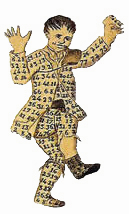Mersenne's Primes and Perfect Numbers
home | courses | topics | theorems | starters | worksheets | timeline | KS3 | KS4 | KS5
Around 300BC Euclid proved that if

is a prime number (it would be a Mersenne prime), then

is a perfect number. A few hundred years ago Euler proved the converse (that every even perfect number has this form). It is still unknown if there are any odd perfect numbers (but if there are, they are large and have many prime factors).
Try to generate few primes and perfect numbers with the above formulas and compare them.

See Eratosthenes' Prime Number sieve and download some worksheets: 100, 200 or 500 number sieve.

What people thought of primes through the history
Prime number (as the one defined by Aristotle, Euclid and Theon of Smyrna) is a number "measured by no number but by an unit alone" Iambilicus said that a prime number is also called "odd times odd".
Prime number was apparently first described by Pythagoras.
Iamblichus writes that Thymaridas called a prime number rectilinear since it can only be represented one-dimensionally.
In English prime number is found in Sir Henry Billingsley's 1570 translation of Euclid's Elements (OED2).
Some older textbooks include 1 as a prime number.
artefacts | numerals | concepts | people | places | pythagoreans | egyptians | babylonians
_____________________________________________________________________________________________________________________
Acknowledgements | Copyright | Contact | Mission Statement | Tell a friend about this site